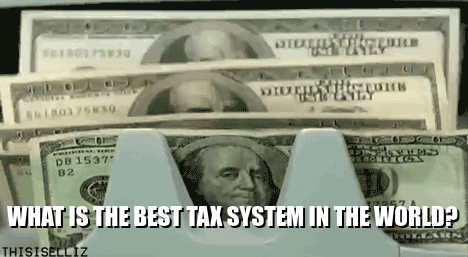
The hardest thing in the world to understand is the tax. Albert Einstein
Let’s start with the question: How would you define the good tax system and the level of its efficiency & competitiveness? Economists, experts, and business persons say that there is no such thing as the absolutely ideal world tax system. The reason for it is that the best tax system shall be the best for all parties and remain without changes for a longer period. However, as various studies reveal, each tax system always has some imbalances – governments regularly want to collect more money whereby businesses and individuals prefer to pay less, thus by default there is a certain contradiction as the best system for the government would not be the best for the taxpayer and vice versa. Moreover, each tax system can have certain imbalances regarding taxation of different types / different level of income. For example, in a certain tax structure there may be some tax benefits for certain types of businesses whereby there may be no such benefits for others activities. Or there may be different taxation regulations depending on the level of income thus may be more beneficial for high vs. mid and low level of income or vice versa. Another element which defines if a country’s tax system is good or not and the level of its competitiveness is if it meets existing expectations and standards of the country’s society at least on the greater end.
In the global expert studies, we can see that there are various requirements expected from a good tax system such as efficiency, predictability, competitiveness, clarity, stability, etc. whereby it still needs to generate the necessary amount of public revenue for the state to cover its budgeted expenses. On the other end, the level of direct and indirect taxes and its structure shall be acceptable and not harm the business climate and country’s global competitiveness.
Means the best tax system characteristics shall be as follows:

- Have minimum taxes on companies and individuals
- Produce sufficient income for the government spending
- Be fair and effective for everyone involved
- Be competitive on the international scale
- Have clear and understandable tax code
As we cannot clearly define the tax system which is the best for both ends. For example, if can be tax-free and highly efficient for individuals, but have hefty taxes on corporate. Or be very complicated for tax filing and its tax code may be very hard to understand and fulfill. In our present overview, we concentrate on the tax systems which are the best in the word from the point of view of a taxpayer.
Best World Tax systems – how taxpayers see it and which ones are really the best for them
Most of the developed countries have quite complicated and strict tax systems where the total tax index can be close to 50% or even higher. Unfortunately, such systems cannot be called the world’s best from the taxpayer view whereby these counties are forced to keep such tax policies due to high government spending.
Each tax system regularly has different types of taxation with different total tax index which can generally be divided into two main groups - corporate as well as personal. Combination of all these taxes and its structure form the tax system. Some tax systems are more simple than the others; some can be quite complicated and have multiple layers of taxes. The tax systems of the world can also be categorized depending on tax structure - proportional, progressive and regressive. Proportional tax means about the same level of taxation for everyone independently from the income level. Progressive means more income - higher taxes apply. Regressive - more income - less taxes.
As there so many elements & characteristics which form good tax system and so many parties with different interests involved, there is no such thing as an ideal tax system in the world for both the taxpayer and the country, same as there is no ideal book or movie as each one of us has different expectations and standards.
However, there are certain international justifications which can be classified as the ones offering highly attractive & efficient tax systems which may be the best for a large number of businesses and persons/ individuals. For example, one of the well-known countries which offer highly attractive tax system for private individuals is Monaco. The residents of this country are tax-free when paying personal income tax thus this solution can be considered as the world’s best for the wealthy individuals. However, this country is rather costly to live in (particularly the component of the real estate – its purchase or rent). Moreover, the tax structure is designed such a way that you need to stay most of the time in Monaco to qualify to tax residency there, which may be not suitable for the ones who need to travel a lot. Another element which critically limits the attractiveness of Monaco is that the non-taxation applies only to personal income and if you have your international business – it would be taxed accordingly.
There are examples of corporate tax-free systems which may be the best for business are the tax systems which is offered by various offshore jurisdictions such as, for example, Seychelles, Belize, Panama and alike. Any business registered there would be tax-free in terms of corporate income and require no tax filing, only yearly audits. However, this tax-free regime applies only to the business done outside of these countries. Moreover, these international business companies have special status and are not tax-resident in the county of registration which imposes certain limitations on its use. Thus this tax system is good, but clearly not the best one in the world.
There is globally acknowledged International Tax Competitiveness Index (ITCI) which measures the efficiency of tax systems & structures based on certain criteria which includes the simplicity of tax system and the total tax rate, its structure, treatment of profits from overseas, etc. – in total it evaluates more than 40 different parameters. Such index is the great indicator for international business and international capital which are highly mobile in today’s globalized world. Means the businesses constantly screens the changes in tax systems of different countries and can move fast to the jurisdiction which offers them the best tax system in the world at the given time and for their given purposes. This is especially true due to the technological and communication developments which made it much easier and faster for businesses to move from one jurisdiction to another and be operational on the global scale.
Another valuable source of information which provides yearly evaluation of efficiency & structure of various international tax systems and outlines the best ones for each year are the yearly analytical reports of PWC (PricewaterhouseCoopers). You can easily find the yearly update of this highly useful report by searching in Google “Paying Taxes PWC”.
As according to the latest studies UAE and Qatar are offering presently the top tax systems in the world followed by Saudi Arabi, Hong Kong, and Singapore.
For example. The global average time required for all tax returns filing and reports is 240 hours and has on average 24 payments whereby in some countries the time required may be more than 500 hours and more than 50 payments. In the UAE the reporting and tax filing takes on average 12 hours (thanks to the clear and simple tax code and regulations) per year only and 4 payments per annum.
UAE, when compared to other countries, offers the unique combination of tax-free income not only for corporate entities which can do business inside and outside of the country as well as for individual taxpayers who reside in the county. Such tax system characteristics with zero index for the total tax for business and personal income is quite unique thus can be considered as one of the very attractive ones in the world.
How to choose the good tax system for you
There is no such thing as the perfect solution for everyone. The simple fact that you may pay less taxes in a certain country may not be the decisive factor. For example, if your business is closely linked to a certain country and you cannot move it from there to somewhere else, there is no point in considering other countries. Or you may have a case when all your family links and ties are in a given country, and you are very unlikely to move to another country just for the reason of having less income tax. Thus you need to take a number of factors and:
- Analyze your current status in terms of income structure and ties to certain country/countries.
- If there are certain elements which can potentially be restructured - define such.
- See the possible solutions and the advantages you can obtain via a change.
- Analyze the associated efforts and costs needed to implement the changes.
- Consider the legal and other implications as restructuring (corporate or personal) is quite a complex matter.
Top 5 facts on Dubai taxes as the best tax system in the world
Considering the facts and data above and the evaluations of PWC and ITCI at present-day the UAE tax system is one of the best in the world. The only tax applicable in the United Arab Emirates is the VAT tax of 5% which is applicable form the beginning of 2018 and applies to goods and services supplied in the UAE. Means if you do international business over your UAE company, the VAT tax would not be applicable. When considering the UAE tax system & structure from the point of other factors which define the efficiency, characteristics, and attractiveness of tax system it also clearly leads.
Indirect taxes as part of a global and the UAE tax system
There are certain indirect taxes which apply in most of the countries. Such taxes are, for example, the taxes included in the fuel prices (in some countries such tax can be up to 50 and more percent from the fuel price), tool gates, etc. In case of the UAE, it has license fees for the companies along with other charges such as establishment card, employees visa costs, etc. There are also indirect taxes in the form of relatively high communication costs. Generally, the UAE tax system can be seen as regressive as more income companies receive - less costs in percentage it has in terms of the indirect costs it has paid in form of licenses and similar.
Other factors of a good tax system

As was outlined in the intro section of our overview, other elements which constitute good tax system are the clear regulatory system and its stability. In terms of its clear rules – the UAE tax system is extremely clear and straightforward when compared to international standards. If a company is subject to VAT tax, it shall file the respective VAT tax declarations on the pre-defined intervals. Otherwise, at the end of each year, a company shall file audit reports which result no tax liabilities.
The other factor – tax system stability – is also on the very positive side. As the UAE introduced VAT of 5% at the end of 2018, there are no other changes expected in the coming years.
Seeing the corporate and personal taxes as an integral part of the system
Tax-free or low corporate taxation is only one element of the good tax structure puzzle. Other critical element is the personal taxation of the country’s residents.
In terms of income reporting to tax authority of private persons/taxpayers residing in the UAE – there is no requirement for filing any tax declarations at all. And, as there are only certain fix indirect costs such as, for example, your visa costs, your personal taxation in the UAE is of the regressive nature. There are not so many countries we are aware of where there is such regulation.
And we need to mention that the above is combined with the great network of double tax treaties signed by the country with other countries in the world.
Table with main taxes in the UAE - looking at the tax structure in details
Even though the regressive tax system is extremely beneficial for UAE taxpayers, it is still good enough for the government. If you analyze the UAE budget structure, it is well balanced and is supported with other sources of income. The UAE economy is the second-largest in the GCC region after Saudi Arabia. Around thirty percent of the GDP comes from oil and gas. The remaining comes from tourism government services and other sources.
On indirect taxes in the form of different government fees and public service fees and charges – UAE has made the official announcement in March 2018 that there would be no hikes in government fees for the next 3 years. Such regulation was made in order to boost further the economic competitiveness of the country.
The above- mentioned tax system which, as you can see from its characteristics, is one in the world, and is greatly combined with the highly attractive business environment and the possibility to obtain residency status with tax-free personal income regime by the official “residency by investment” schemes.
If you want to:
- Register your company in the UAE
- Become tax resident in the UAE
- Know the best solution for the above
please feel free to send us your questions.














